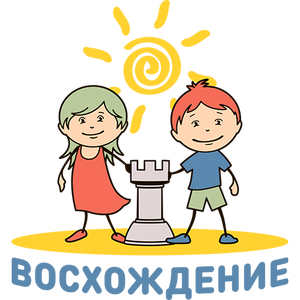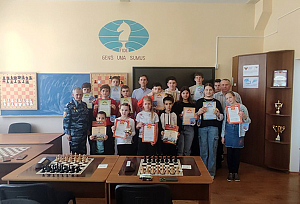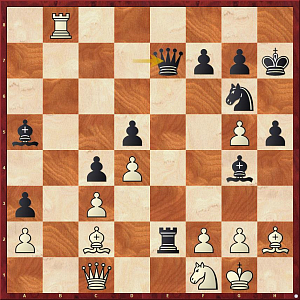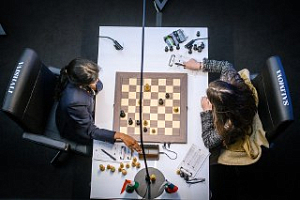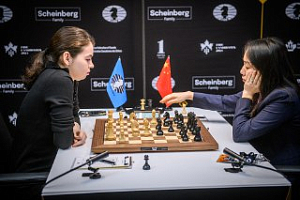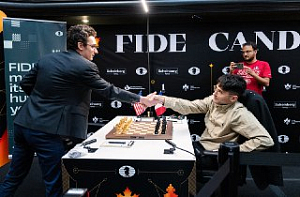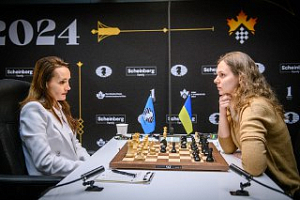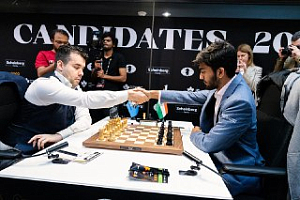8 July 2016
Mark Dvoretsky: Players Could Benefit From Avoiding Studying Theory
The famous coach answers the questions of Vladimir Barsky.
– Maia Chiburdanidze recently held a Cup named after herself that featured drawing of preselected openings procedure: she had prepared 120 opening "tabiyas", one of which was fished out to begin a game with. How do you feel about this idea? Almost as far back as ten years ago, you suggested starting games from positions in which each of the opponents was to advance his pawn no further than one square forward.
– It was a great pleasure for me to read over Maia Chiburdanidze's interview. I am very content with what is proposed, which, in fact, is the same idea, albeit in a somewhat different form. Maia's chain of reasoning is almost similar to mine, with me emphasizing the psychological side, and Maia putting stress on the medical aspect, taking care of the players' health. In my opinion, this is a great idea to release players from the daily burden of toilsome opening preparation routine consisting of repeating, memorizing, and having to stare at computer screens for the duration of 5-6 hours... Sometimes this work yields interesting results, but in principle, this is a hard and thankless task, which is best dispensed with so that people could show their natural talents.
Even though Maia's idea is very appealing, there are still some questions that need answering. For example, I was surprised that, according to the interview, certain tabiyas would feature positions arising after move 3-4, while other positions would kick off from move 15. This gap is just too wide! How are you supposed to go about time control in this case?
As for my proposal, it clears this and some other issues, but has an inherent flaw at that which was once rightly pointed out to me by Vadim Zvjaginsev in the course of one of our conversations. Since the initial moves, made according to drawing of lots are modest (pawns advancing one square ahead only), the games could tend to be more boring than those played according to the modern theory, which often lead to sharp clashes. On the other hand, Maia's positions are perhaps of greater vitality.
If it ever comes to a successful method of selecting the starting positions to allow working around the issues that arise nowadays and this idea becomes widely spread, it would only make me happy. It is also not to be ruled out that some kind of a sweet spot between her and my proposals might wind up being feasible after all. I see no obvious drawbacks with such an approach. As for the Fischer chess, it still has a major incurable drawback, which I have already written about elsewhere. It seems to me that chess players could only benefit from avoiding too much study of the opening theory as it would free them towards being engaged in creative affairs both in-between and during competitions and tournaments.
– I have heard an opinion that there is so much knowledge nowadays that committing it all to your memory is impossible, so grandmasters have started to turn away from home preparation. They are not exactly without an opening repertoire, but with some kind of a “lite” one.
– This is not exactly the case. It is not so much about the opening theory, but simply that Carlsen has advanced to the forefront, and he is the trendsetter in chess at present with people imitating him. In Kasparov’s days, on the contrary, everyone tried to study openings as deeply as possible. Carlsen has demonstrated that you are able to play based on mastery, will to win and other qualities, without having any hardwired opening repertoire. But even now chess players still can’t afford to get by without getting along with openings. Perhaps they do not study a lot of forced variations, but opening preparation takes up a large chunk of their time.
– Is it because of that that their performance in the middlegame and endgame suffers?
– This is unquestionably so, but not only because there’s almost no time left to work on other stages, but also because of the advent of computers. Chess players receive ready-made answers, while in the past finding answers required having to switch on their brains to full capacity much more often, and thus they were constantly training different skills and decision-making habits. It goes without saying that it would be stupid nowadays not to exploit such a powerful tool as a computer, but you have to be able to combine working with it and training your mind. The most important task of coaches is to help their students come to terms with that process.
– You once discontinued working with Ernesto Inarkiev largely due to his excessive enthusiasm for studying openings, but have you maintained good relationships with him and do you keep track of his games?
– This is by all means so.
– So, we should also congratulate you on Ernesto’s victory at the European Championship!
– We should, first of all, congratulate Ernesto himself, however. He is a very determined, strong-willed and hard-working player and he seeks the best path. It seems to me that he managed to get away from that one-dimensional approach he used to have at the time, and I am very glad that he has really added something to his play. Ernesto has begun playing better, more confidently, whereas the quality of his game has stepped up. He’s a great guy and I want to wish him a lot of success!
– Do you now regularly collaborate with any promising chess players?
– No. At some point I realized that one of the factors of success (my work has usually been successful, over the course of my whole life) was that I completely immersed myself in the job. I would contemplate all the time the problems of my students, paying attention to the smallest details. Purely based on erudition, on technique, you can demonstrate some interesting things, but you can only really be a good mentor when you fully throw yourself into the work.
While growing older I have less energy now, and when serious health problems arose I sensed that no matter how well I would get along with a student, it would still be very hard to focus on his interests and problems – my own problems would invariably distract me from time to time. Therefore, I no longer have students who I keep coaching on a permanent basis.
Nevertheless, I can still be useful, demonstrating and sharing what I know through the coaching sessions. During those sessions I only take responsibility for the quality of the presented materials, which I use for teaching, and on that account, praise God, there have been no problems up until now. I’ve also begun writing more actively, preparing new books. Such a change in the vector of my activity is simply the result of a sober evaluation of my capabilities.
– Last year your Maneuvering: The Art of Piece Play was published, and very recently, Dvoretsky's Endgame Manual. That’s the second edition, isn't it?
– Yes, this is the second one. Meanwhile, in the German language there have already been published five editions – the same number in English as well. Therefore, the book is in high demand.
– Your book “Lessons in Mastery: New Analysis of Old Games” is about to be published. Do you offer consultations to our team from time to time?
– Yes, when they invite me. Earlier, for some reason, they would not invite me, although quite a few of my students would play there. Now, however, they are willing to invite me, but unfortunately, health problems sometimes would get in the way.
– Let us talk a little about our teams. How could the Russian chess team avoid repeating the “success” of our footballers?
– The situation here is different. Our chess team has quite a lot of players who are among the world’s best, so that with good preparation and a reasonable approach they’re perfectly capable of winning the Olympiad. As for our football team, let us take a sober look at that: the group stage saw the Russian team being fourth in terms of ratings – i.e the last one. Even that fourth strongest team ended up losing a few players along the way. I am not a football expert, so I do not know if you should label such players as Zhirkov or Denisov as key players, but you could definitely say that about Dzagoev. And then, it all happened at the very last moment. In fact, the model that Slutsky had been constructing in the qualifying matches suddenly broke down, and it was necessary to come up with an alternative. That is, to replace the above-mentioned Dzagoev. Gazzaev once said that he was not aware of the player named Playmaker. My impression is that Slutsky knew one, but it was hard to come up with replacement.
And why, then, should we expect something else under such circumstances? It’s a shame that the general hype stopped normal specialists from calmly saying: “Guys, if our team qualifies from the group that’ll be a great triumph”. Instead, there was an impression that everyone's expectations were geared towards nothing else but success. Andrey Arshavin once said in a very precise manner: “Your expectations are your problem”.
– He got into so much trouble for that particular statement…
– And absolutely unfairly so, since he wasn’t talking to the fans but to that boor, that petty St. Petersburg official, who decided that being a representative of the authorities allowed him everything and that he was a master of the universe.
– Could the coach have done anything at all under those conditions in order to achieve success?
– Perhaps it was simply impossible to come up with anything. Remember that famous phrase of the naïve man from the Zhvanetsky short story: “Let’s replace this seller with another one – will it be any different”? After two matches everyone was criticising Slutsky for using passive defensive midfielders – Neustädter and Golovin. But Slutsky, after all, is a highest caliber coach, and he didn’t put them there by chance. However, people demanded that he let out an attacking midfielder. I think he understood perfectly well that nothing good would come of it, but he went down that road in the third match against Wales and, in my mind, it worked out worse to a greater degree. It seems he was simply proving something to his critics: “Ah, you’re so smart! Well, take a look at what comes out of your advice”. I understand that Slutsky is a responsible, serious man and did not consciously want to do the team any harm, but that was exactly the impression I got.
I also found it totally disgusting the way the public and journalists attacked the young guy - Golovin at the airport: “Are you ashamed, are you ashamed?” A journalist simply should not ask similar questions! You could ask, “What are your feelings now?”, although it is also not clear why do so as it’s rather obvious, after all.
Golovin is not yet used to such aggression. I think a more experienced player would have given “the only correct” reply that they were expecting, “Well, of course I’m ashamed and I want to apologize to everyone” – something in that spirit. Meanwhile, he’s a young guy not used to playing double games: “I don’t know what I should be ashamed of”. And really, a person is embarrassed if he recognizes that he has done something wrong. However, up until very recently he has been a stand-by player, getting into the team and undoubtedly working hard both in the training camp and during the tournament, trying as hard as he could. However, he is no Messi and he couldn’t singlehandedly save a team that was performing poorly. The result, of course, is a shame, and he feels bitter, but why should he be ashamed? Pseudo-journalists, pestering him with such a question are like Red Guards: those also demanded public repentance from their victims.
Mark Dvoretsky gives a lecture at the Belaya Ladya in Dagomys
– Returning to chess, in a few months we are in for the Carlsen-Karjakin match. Objectively speaking, Carlsen’s results are significantly better. Is Karjakin capable of preparing so as to minimize that gap in strength and reach a level that would allow him beating Carlsen?
– This is precisely what Kramnik achieved in due course of time. After all, Kasparov’s results before and after the match in London were significantly better than his opponent’s. However, Kramnik demonstrated brilliant preparation, and not merely in the realm of chess. Having learned from various sources the work he did and the actions he took, I am simply stunned by how successful and professional his approach used to be, enabling him to achieve a deserved victory.
– So, Sergey still has chances, hasn't he?
– There always exist definite chances, although objectively the situation is the same as it was for the football team – There is no doubt as to who is stronger. And it’s pointless to try and make light of that as it would mean totally ignoring the reality. Nevertheless, I repeat, that it does not mean that Karjakin should lose. By means of intelligent, professional preparation, he could manage to neutralize the gap in strength. Or, perhaps, he will not manage it after all.









